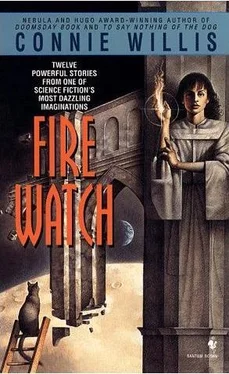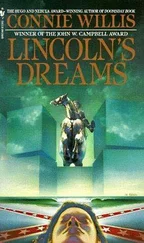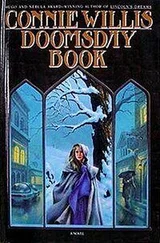And I have mine.
October 21— It’s been nearly two weeks since the blast and I just now realized we haven’t seen the cat since. He wasn’t in the mess in the crypt. Even after Langby and I were sure there was no one in there, we sifted through the stuff twice more. He could have been in the Choir, though.
Old Bence-Jones says not to worry “He’s all right,” he said. “The jerries could bomb London right down to the ground and the cats would waltz out to greet them. You know why? They don’t love anybody. That’s what gets half of us killed. Old lady out in Stepney got killed the other night trying to save her cat. Bloody cat was in the Anderson.”
“Then where is he?”
“Someplace safe, you can bet on that. If he’s not around St. Paul’s, it means we’re for it. That old saw about the rats deserting a sinking ship, that’s a mistake, that is. It’s cats, not rats.”
October 25— Langby’s tourist showed up again. He cannot still be looking for the Windmill Theatre. He had a newspaper under his arm again today and he asked for Langby, but Langby was across town with Allen, trying to get the asbestos firemen’s coats. I saw the name of the paper. It was The Worker. A Nazi newspaper?
November 2— I’ve been up on the roofs for a week straight, helping some incompetent workmen patch the hole the bomb made. They’re doing a terrible job. There’s still a great gap on one side a man could fall into, but they insist it’ll be all right because, after all, you wouldn’t fall clear through but only as far as the ceiling, and “the fall can’t kill you.” They don’t seem to understand it’s a perfect hiding place for an incendiary. And that is all Langby needs. He does not even have to set a fire to destroy St. Paul’s. All he needs to do is let one burn uncaught until it is too late.
I could not get anywhere with the workmen. I went down into the church to complain to Matthews, and saw Langby and his tourist behind a pillar, close to one of the windows. Langby was holding a newspaper and talking to the man. When I came down from the library an hour later, they were still there. So is the gap. Matthews says we’ll put planks across it and hope for the best.
November 5— I have given up trying to retrieve. I am so far behind on my sleep I can’t even retrieve information on a newspaper whose name I already know. Double watches the permanent thing now. Our chars have abandoned us altogether (like the cat), so the crypt is quiet, but I cannot sleep.
If I do manage to doze off, I dream. Yesterday I dreamed Kivrin was on the roofs, dressed like a saint. “What was the secret of your practicum?” I said. “What were you supposed to find out?”
She wiped her nose with a handkerchief and said, “Two things. One, that silence and humility are the sacred burdens of the historian. Two"-she stopped and sneezed into the handkerchief—“don’t sleep in the tubes.”
My only hope is to get hold of an artificial and induce a trance. That’s a problem. I’m positive it’s too early for chemical endorphins and probably hallucinogens. Alcohol is definitely available, but I need something more concentrated than ale, the only alcohol I know by name. I do not dare ask the watch. Langby is suspicious enough of me already. It’s back to the OED, to look up a word I don’t know.
November 11— The cat’s back. Langby was out with Allen again, still trying for the asbestos coats, so I thought it was safe to leave St. Paul’s. I went to the grocer’s for supplies, and hopefully an artificial. It was late, and the sirens sounded before I had even gotten to Cheapside, but the raids do not usually start until after dark. It took awhile to get all the groceries and to get up my courage to ask whether he had any alcohol-he told me to go to a pub-and when I came out of the shop, it was as if I had pitched suddenly into a hole.
I had no idea where St. Paul’s lay, or the street, or the shop I had just come from. I stood on what was no longer the sidewalk, clutching my brown-paper parcel of kippers and bread with a hand I could not have seen if I held it up before my face. I reached up to wrap my muffler closer about my neck and prayed for my eyes to adjust, but there was no reduced light to adjust to. I would have been glad of the moon, for all St. Paul’s watch cursed it and called it a fifth columnist. Or a bus, with its shuttered headlights giving just enough light to orient myself by. Or a searchlight. Or the kickback flare of an ack-ack gun. Anything.
Just then I did see a bus, two narrow yellow slits a long way off. I started toward it and nearly pitched off the curb. Which meant the bus was sideways in the street, which meant it was not a bus. A cat meowed, quite near, and rubbed against my leg. I looked down into the yellow lights I had thought belonged to the bus. His eyes were picking up light from somewhere, though I would have sworn there was not a light for miles, and reflecting it flatly up at me.
“A warden’ll get you for those lights, old tom,” I said, and then as a plane droned overhead, “Or a jerry.”
The world exploded suddenly into light, the searchlights and a glow along the Thames seeming to happen almost simultaneously, lighting my way home.
“Come to fetch me, did you, old tom?” I said gaily “Where’ve you been? Knew we were out of kippers, didn’t you? I call that loyalty.” I talked to him all the way home and gave him half a tin of the kippers for saving my life. Bence-Jones said he smelled the milk at the grocer’s.
November 13— I dreamed I was lost in the blackout. I could not see my hands in front of my face, and Dunworthy came and shone a pocket torch at me, but I could only see where I had come from and not where I was going.
“What good is that to them?” I said. “They need a light to show them where they’re going.”
“Even the light from the Thames? Even the light from the fires and the ack-ack guns?” Dunworthy said.
“Yes. Anything is better than this awful darkness.” So he came closer to give me the pocket torch. It was not a pocket torch, after all, but Christ’s lantern from the Hunt picture in the south nave. I shone it on the curb before me so I could find my way home, but it shone instead on the fire watch stone and I hastily put the light out.
November 20— I tried to talk to Langby today. “I’ve seen you talking to the old gentleman,” I said. It sounded like an accusation. I meant it to. I wanted him to think it was and stop whatever he was planning.
“Reading,” he said. “Not talking.” He was putting things in order in the choir, piling up sandbags.
“I’ve seen you reading then,” I said belligerently, and he dropped a sandbag and straightened.
“What of it?” he said. “It’s a free country I can read to an old man if I want, same as you can talk to that little WVS tart.”
“What do you read?” I said.
“Whatever he wants. He’s an old man. He used to come home from his job, have a bit of brandy and listen to his wife read the papers to him. She got killed in one of the raids. Now I read to him. I don’t see what business it is of yours.”
It sounded true. It didn’t have the careful casualness of a lie, and I almost believed him, except that I had heard the tone of truth from him before. In the crypt. After the bomb.
“I thought he was a tourist looking for the Windmill,” I said.
He looked blank only a second, and then he said, “Oh, yes, that. He came in with the paper and asked me to tell him where it was. I looked it up to find the address. Clever, that. I didn’t guess he couldn’t read it for himself.” But it was enough. I knew that he was lying.
He heaved a sandbag almost at my feet. “Of course you wouldn’t understand a thing like that, would you? A simple act of human kindness?”
Читать дальше












